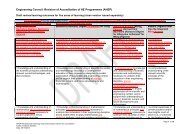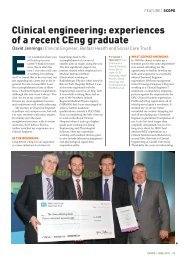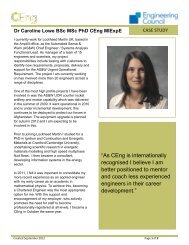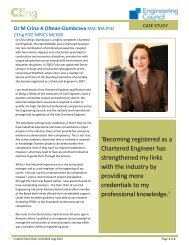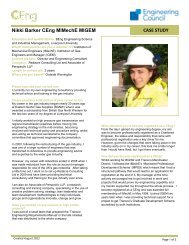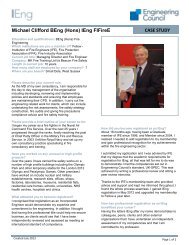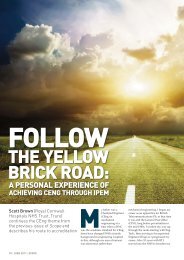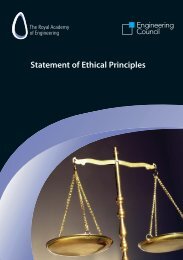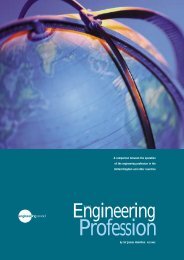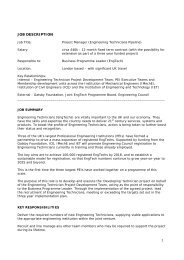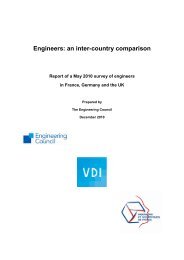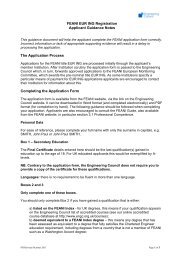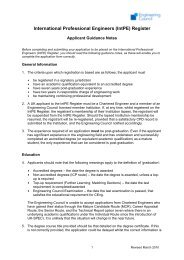An Engine for Change - A Chronicle of the Engineering Council
An Engine for Change - A Chronicle of the Engineering Council
An Engine for Change - A Chronicle of the Engineering Council
Create successful ePaper yourself
Turn your PDF publications into a flip-book with our unique Google optimized e-Paper software.
1988-1990: THE BARLOW YEARS 79The Award <strong>for</strong> Industrial Innovation and ProductionIn May 1988 <strong>the</strong> EngC published ‘Innovators Need More Than Ideas’ as a handbook <strong>for</strong>industrial and business innovators. It contained a <strong>for</strong>eword by His Royal Highness The Prince<strong>of</strong> Wales in his capacity as Patron <strong>of</strong> <strong>the</strong> ‘Award <strong>for</strong> Industrial Innovation and Production’.The original long-term aim <strong>of</strong> <strong>the</strong> Award was to encourage contestants to take <strong>the</strong>irbusinesses <strong>for</strong>ward into production. The handbook was distributed through <strong>the</strong> auspices <strong>of</strong>Business in <strong>the</strong> Community, <strong>the</strong> British Venture Capital Association and <strong>the</strong> UK SciencePark Association. Copies were also sent to <strong>the</strong> Small Firms Service <strong>of</strong> <strong>the</strong> clearing banks. The1988 presentations <strong>for</strong> <strong>the</strong> Award were made, as in 1987, by HRH Prince Charles atHighgrove House. Surgeon David Sharpe, <strong>the</strong> winner, had invented a plastic surgicalretractor. The ceremony was shown, also as in 1987, on BBC’s Tomorrow’s World. During<strong>the</strong> year a group <strong>of</strong> venture capital firms supported <strong>the</strong> Award financially.Finalists in <strong>the</strong> Prince <strong>of</strong> Wales Award <strong>for</strong> Innovation and Production in 1989 were againhosted by <strong>the</strong> Prince at Highgrove House, and filmed by Tomorrow’s World. Drs John Holianand John Edwards <strong>of</strong> Amersham International plc won <strong>the</strong> Award <strong>for</strong> ‘Amerlite’, aninvention based on horseradish to help doctors diagnose cancer, thyroid disorders andpregnancy abnormalities. The Award was hence<strong>for</strong>th administered by Business in <strong>the</strong>Community. In 1990 <strong>the</strong> EngC gave evidence to <strong>the</strong> House <strong>of</strong> Lords Select Committee onScience and Technology, exhorting more Government support <strong>for</strong> innovation.EngC Staff <strong>Change</strong>sA number <strong>of</strong> personnel associated with <strong>the</strong> EngC changed towards <strong>the</strong> close <strong>of</strong> <strong>the</strong> 1988 to1990 period. Early in 1990 <strong>the</strong> EngC recruited Miss Pattie Mee as a Partnership Manager(funded <strong>for</strong> a year by DTI in conjunction with Business in <strong>the</strong> Community, to promote itsEnterprise and Education Initiative with companies) to bring companies, schools and collegescloser toge<strong>the</strong>r.Graham <strong>An</strong>thony, Director - Industry and Regions, who took early retirement in 1990, writes:“Frank Tombs and Kenneth Miller had <strong>the</strong> <strong>for</strong>esight to integrate (school) Education into myIndustry Directorate. We had a springboard to support ‘Problem Solving in Primary Schools’and to proselytise <strong>the</strong> major work we did with ‘A Call to Action’ which establishedcontinuing education and training as a fundamental ingredient to today’s engineeringknowledge.“The initiative which gives me most satisfaction is ‘Neighbourhood <strong>Engine</strong>ers’. Both <strong>the</strong>Affiliates and <strong>the</strong> ECROs readily embraced this scheme as a practical way <strong>of</strong> helping ourschools develop <strong>the</strong>ir technical skills. I worked very hard in <strong>the</strong> ECROs because <strong>the</strong>iractivities crossed all <strong>the</strong> traditional boundaries, and could potentially have been a realunifying <strong>for</strong>ce at <strong>the</strong> grassroots”.At <strong>the</strong> beginning <strong>of</strong> 1990 ano<strong>the</strong>r industrialist, Perry Goodman BSc, MICeram, FRSA, Head<strong>of</strong> <strong>the</strong> Electrical <strong>Engine</strong>ering Branch <strong>of</strong> <strong>the</strong> DTI, took over from Graham <strong>An</strong>thony as Director- Industry and Regions. Perry Goodman had been Scientific Counsellor at <strong>the</strong> BritishEmbassy in Paris and <strong>the</strong>n involved in British Government design policy and advisoryservices <strong>for</strong> industry. Within <strong>the</strong> private sector his work had included research, developmentand process control on refractory materials.© <strong>Engine</strong>ering <strong>Council</strong> UK 2004



